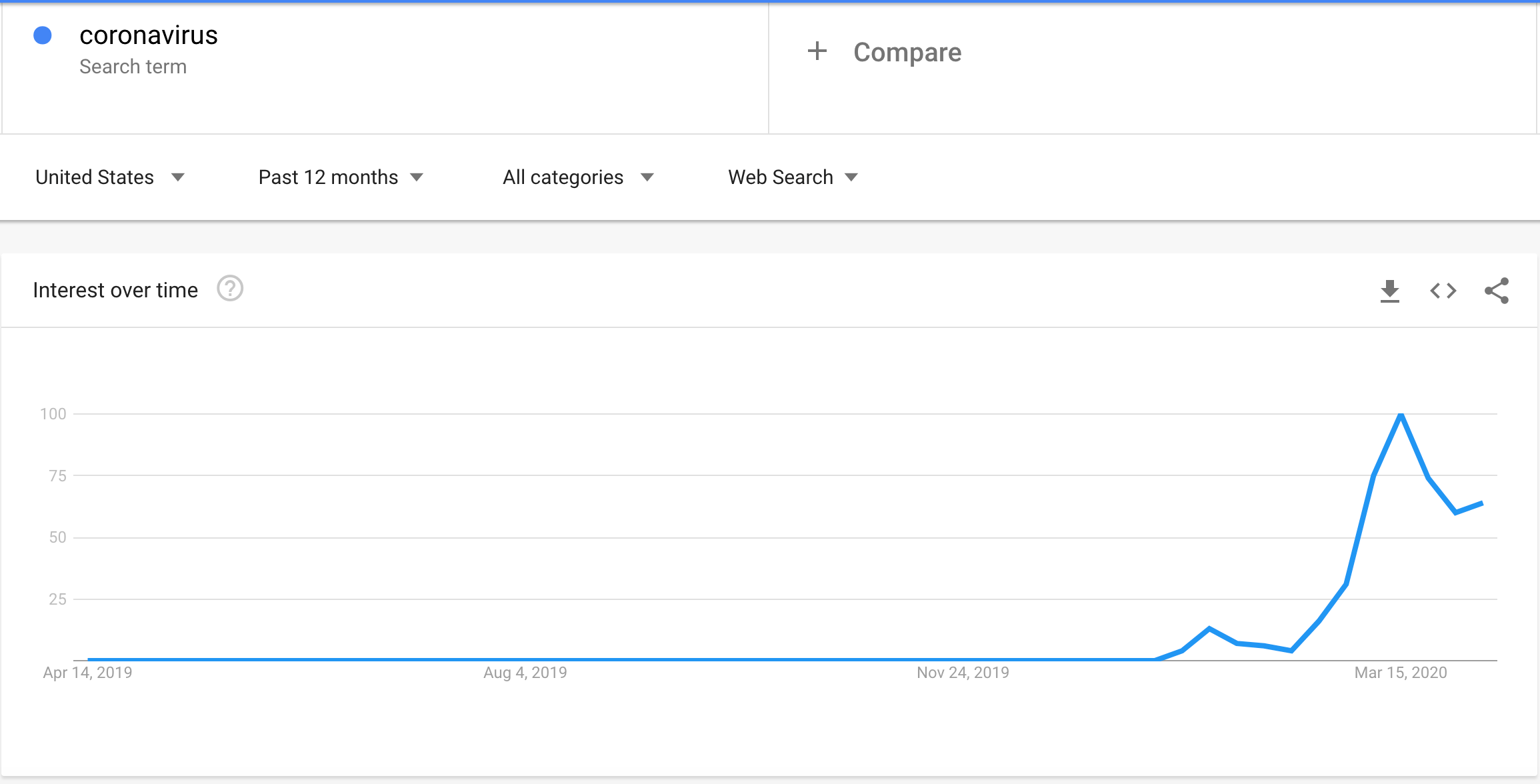Search behaviour will always reflect the changing economic and social uncertainties that exist in a society. As the world continues to be affected by the spread of Coronavirus, the influence on search habits, consumer choices and the role of news outlets continues to change.
The COVID-19 pandemic has caused economic impacts that have not been experienced since the Global Financial Crisis of 2008. As the virus continues to touch people across the world, the consequences are felt by almost every industry.
Digital marketing is sensitive to changing consumer behaviour. As millions of people across the world lose their jobs, the economic impact is visible in the data. Consumers are tightening their waistband and pulling back on non-essential spending as they move towards an uncertain future.
The Google search trends data tool is a data-backed way of measuring COVID-19 concerns on a day-to-day basis. Using data to rate consumer behaviour on a scale of 0-100, we can see the dramatic growth in key search phrases that reflect changing user concerns. Safari Sydney observed that Google's search trends scale rated Coronavirus related search behaviour at 6/100 at the beginning of March 2020. By the 20th of March, this number hit its peak of 100/100 with users reacting to media influences and seeking out COVID-19 information online.

The negative impact of COVID-19 is visible in almost every industry. Several business sectors are seeing a positive uplift in business as users seek out essential information, goods and service. Search insight data provides an unbiased glimpse into the various ways COVID-19 is changing search behaviour and intent online. Here are the notable changes so far:
Essential Ecommerce Businesses Are Thriving
Consumers have ravished supermarkets and pharmacies in a bid to 'stock up' for the uncertain months ahead. Increasingly, users are turning online to source items that are no longer available in store. Hand sanitizers, face masks, and even toilet paper has been sold-out for weeks as users look for an alternate, online route to obtain essentials. In turn, search queries related to purchasing necessities online have surged since the beginning of March 2020.
E-Commerce businesses and online marketplaces such as Amazon, Walmart and eBay have seen a significant increase in online spending. To avoid contact with the virus and panic buying, users are seeking out essential products online.
"Near Me" related queries have also skyrocketed. Users are seeking local solutions to their problems. Reduced mobility amid lockdown restrictions across much of Western Europe and the Eastern States of the United States has seen consumers looking for local solutions.
The Tourism Industry is Suffering
Tourism oriented search queries are on hold. Global travel restrictions have brought tourism and travel industries to their knees. With so much uncertainty and no definitive timeline in place, consumers have withdrawn from tourism spending entirely. With no end in sight, users are not able to confidently plan travels for the foreseeable future.
Trip.com Group Ltd has recorded a 68% drop in share price since the beginning of March 2020 with consumers scrambling to cancel travel plans and seek refunds. Unlike most industries, the decline in travel-related search queries has come to a sudden standstill. While there are plenty of users searching for refund and cancellation information, popular keywords such as "cheap flights" and “cheap accommodation” have come to a complete halt.
As expected, cruise, hotel and accommodation-related enquiries have also declined. Users continue to seek information around travel restrictions.
Health & Wellness Searches Are Up
Users are hungry for information surrounding health and wellness. With so much uncertainty, health-related searches have sharply increased as users look for ways to protect themselves against COVID-19, prevent the spread of the virus, as well as health and wellness activities that can keep them occupied during confinement.
Popular health and fitness platforms such as Nike Exercise and Swift have offered reactive solutions to keep themselves in the public's good graces and avoid membership cancellations during this period.
Online publications are pushing out COVID-19 information at an unprecedented rate. To keep up with user demands and search trends, online media outlets are publishing symptom information and home treatment options. According to Google search data, there has also been a sharp increase in searches for natural remedies such as "antibacterial essential oils", "antiviral foods", and "ways to boost your immune system".
The public is hungry for preventative health information. Outlets that are producing reactive content to combat the increased demand are seeing a sharp increase in web traffic.
Wrapping up
Search data is a meaningful way to understand the changing user behaviour around COVID-19. It is an uncertain time for countless industries. Selected essential businesses can benefit from reviewing Google search trends to gauge user behaviour and create reactive campaigns that address user needs and concerns.
